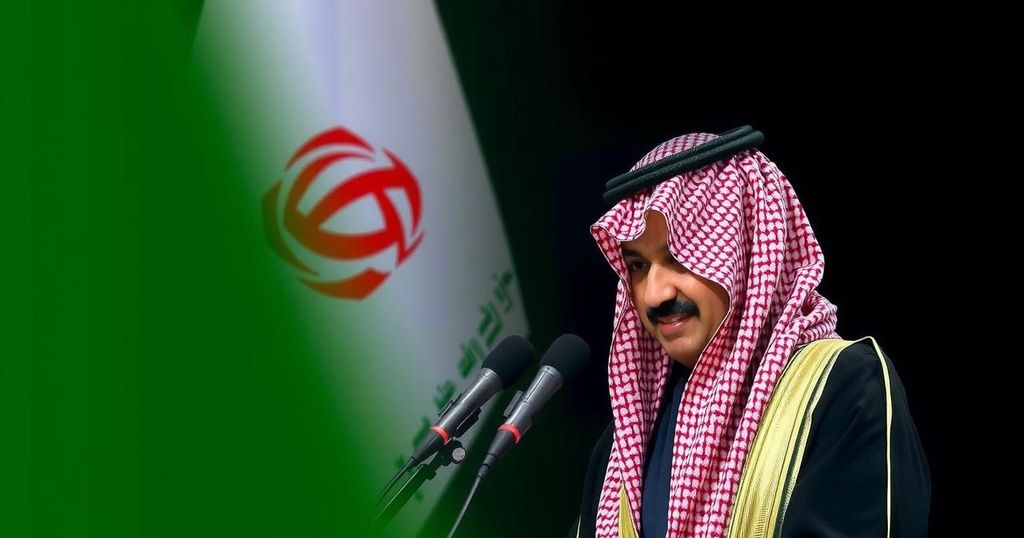Saudi Arabia’s Diplomatic Shift: MBS’s Criticism of Israel and Pivot to Iran

Saudi Crown Prince Mohammed bin Salman has issued rare critiques of Israel, emphasizing the Palestinian issue and announcing a pivot towards Iran. This shift follows a publicly reconciliatory gesture towards Iran and reflects concerns over U.S. reliability and regional power dynamics. Bin Salman’s stance signals a pragmatic approach to align with stronger regional powers amidst evolving geopolitical landscapes.
Recent statements made by Saudi Crown Prince Mohammed bin Salman (MBS) at the joint Arab League and OIC summit signal a significant pivot in Saudi Arabia’s foreign policy, particularly regarding Israel and Iran. MBS publicly condemned Israeli actions in Palestine and Lebanon, marking a stark contrast to his previous stance where he deemed the Palestinian issue as less critical. This change of tone arises following a reconciliation between Saudi Arabia and Iran facilitated by China, prompting observers to reconsider the implications for Israel and the U.S. relationships in the region. The backdrop of these developments is essential to understanding this shift. The normalization talks between Saudi Arabia and Israel were previously viewed as imminent, yet the recent comments indicate that MBS is realigning his focus toward Iran, Israel’s foremost regional adversary. Analysts argue that this could stem from the perception of a weakened U.S. influence under the Biden administration, which has affected Saudi Arabia’s approach to security guarantees and alliances. Bin Salman appears to be acting from a position of pragmatism, recognizing that, while he seeks to fortify Saudi Arabia’s military capabilities, he must first establish strategic alliances that deter Iranian aggression. His public acknowledgment of potential Saudi nuclear ambitions in response to Iranian nuclear developments further underscores this cautious approach. Dr. Dan Diker’s commentary on Israel’s reestablished regional strength serves to highlight this changing power dynamic. According to Diker, Prime Minister Netanyahu has effectively reinforced Israel’s position as a leading power in the Middle East. Furthermore, the historical context, illustrated by Lee Smith’s concept of the “strong horse,” suggests that regional states tend to gravitate towards perceived strength. In light of this, MBS’s recent remarks may serve dual purposes; they are directed toward Israel but arguably aimed at securing a stronger position with Washington. The implications of these developments are profound, indicating a possible reevaluation of Saudi relations with both Iran and Israel contingent upon U.S. policies. As MBS navigates these shifting landscapes, his statements reflect an urgent desire for clarity from the current U.S. administration regarding its stance and commitments in the region. This scenario suggests a complex tapestry of alliances and enmities continuously evolving in the geopolitics of the Middle East.
Saudi Arabia’s recent diplomatic maneuvers signify its complex geopolitical landscape, particularly its relationships with Israel and Iran. Crown Prince Mohammed bin Salman has reemphasized the Palestinian cause in his rhetoric, marking a notable shift from prior interactions that emphasized improving ties with Israel. The reconciliation between Saudi Arabia and Iran, engineered by China, demonstrates a strategic pivot that acknowledges Iran’s influence while questioning the reliability of U.S. support. This shift is vital in understanding MBS’s recent statements as a reflection of both regional realities and his ambitions for Saudi Arabia’s role in the Middle East.
In conclusion, Mohammed bin Salman’s recent criticism of Israel illustrates a marked shift in Saudi Arabia’s foreign policy, emphasizing commitment to the Palestinian issue and a strategic alignment with Iran. This change is influenced by perceived shifts in U.S. foreign policy and the complexities of regional security dynamics. As Saudi Arabia navigates this new landscape, MBS is likely positioning the kingdom to safeguard its interests in an uncertain geopolitical environment.
Original Source: allisrael.com








